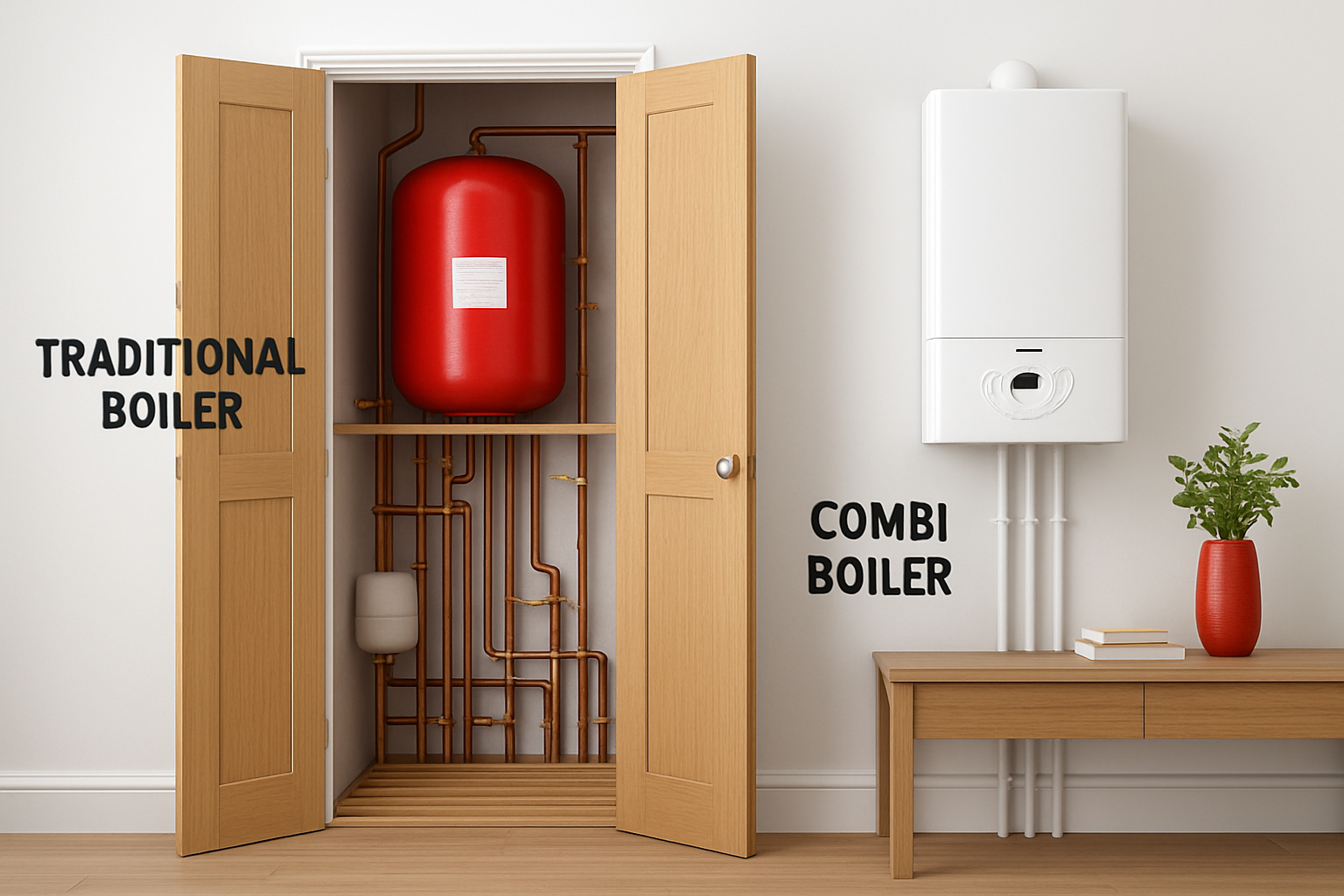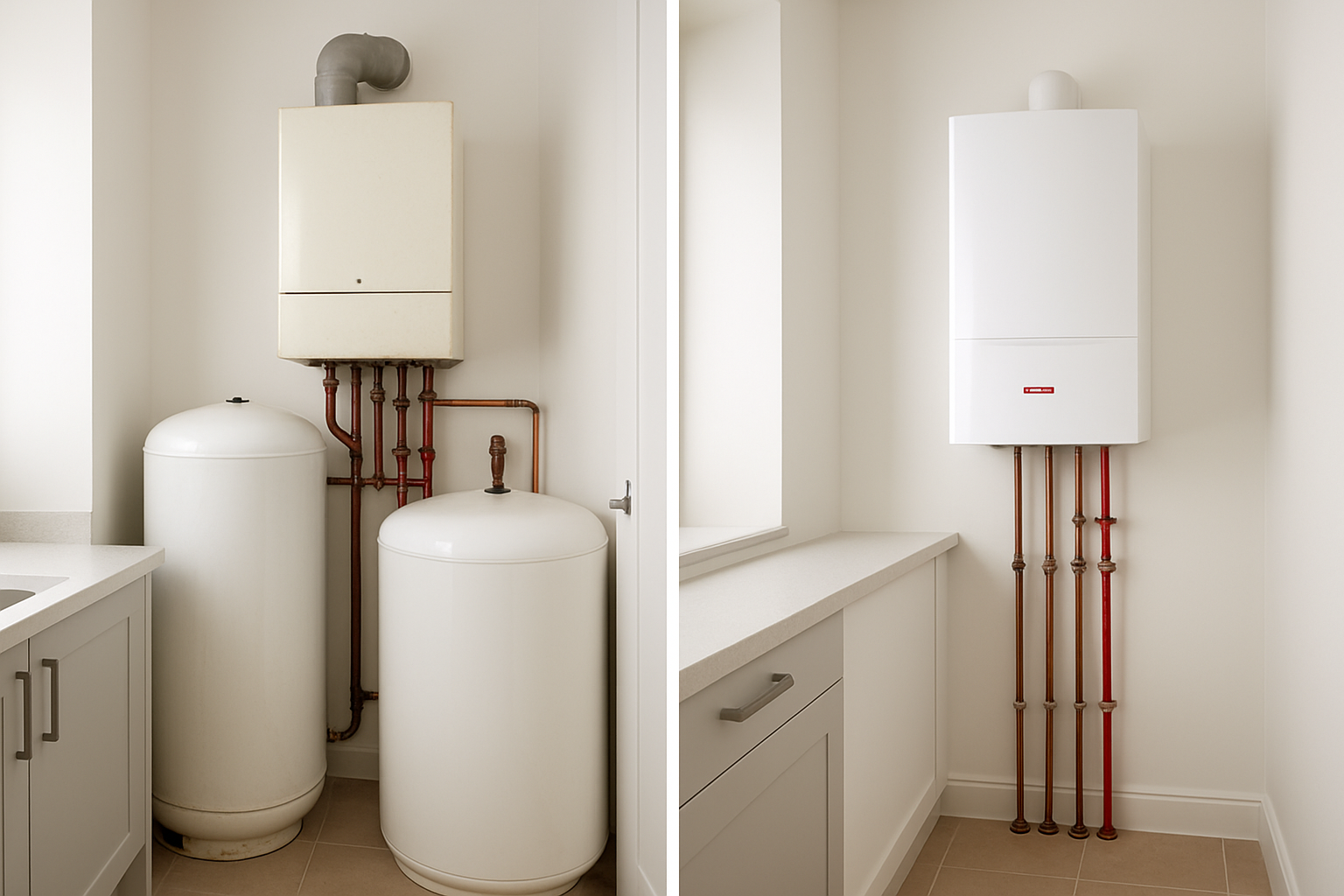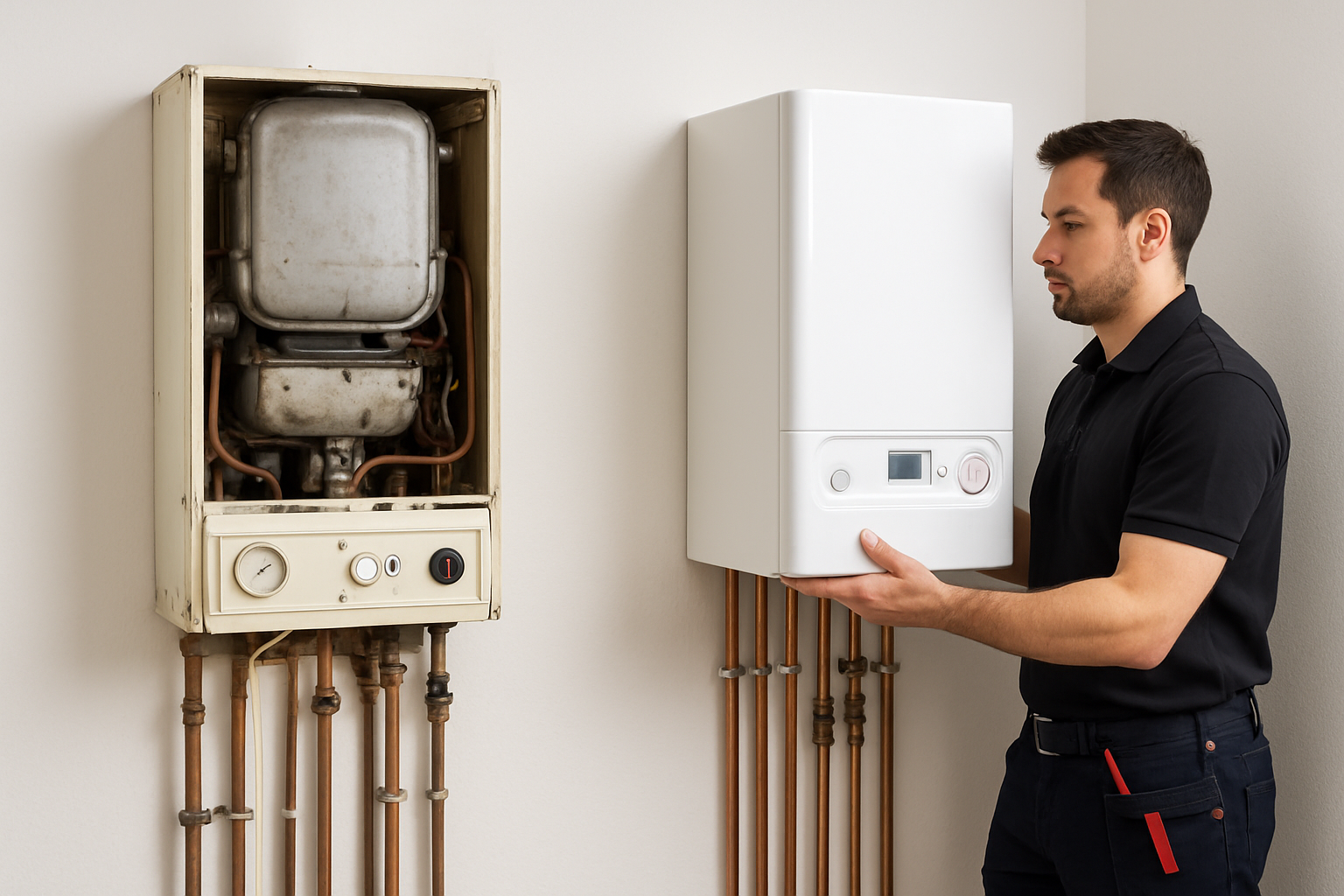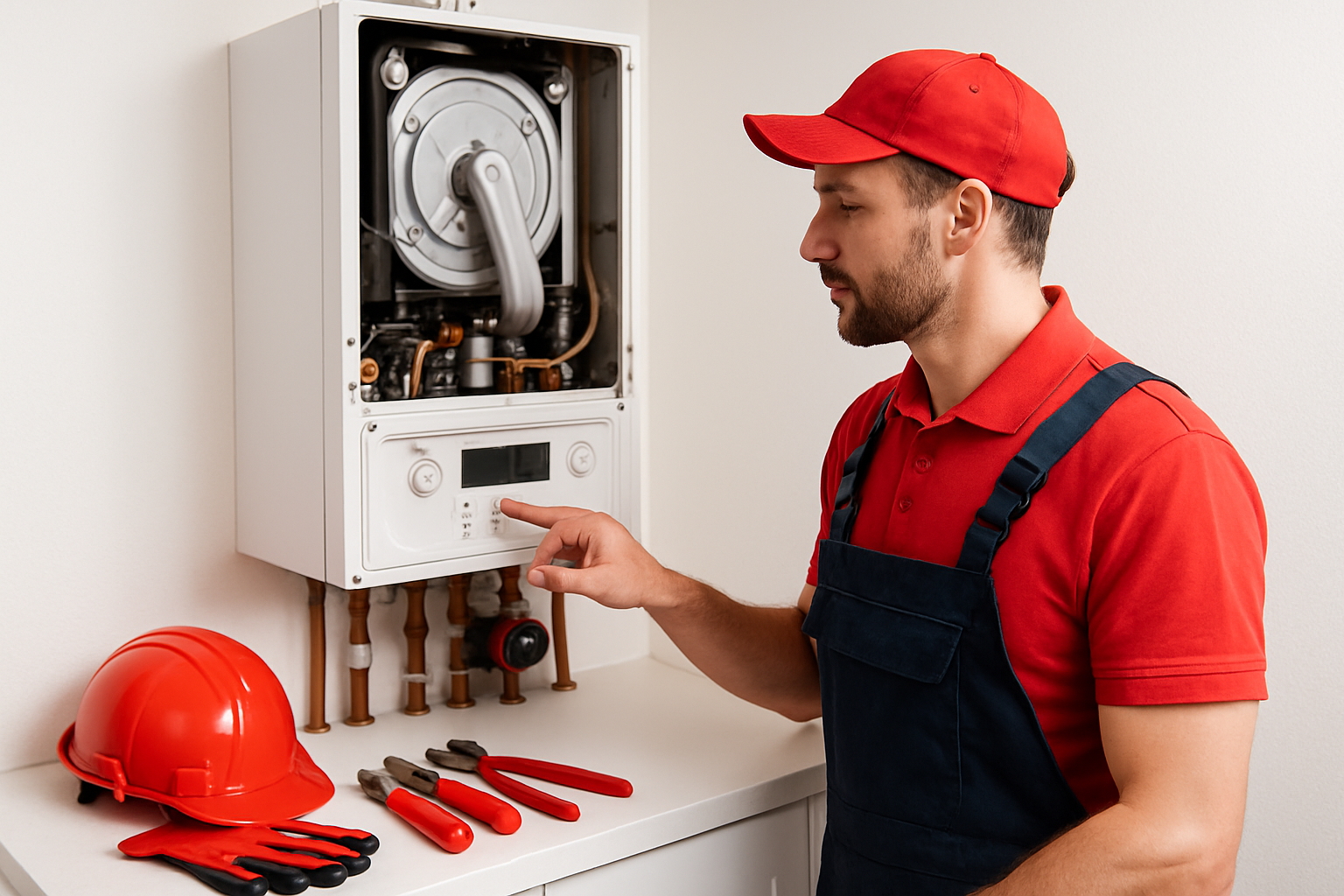Replacing Boiler With Combi Boiler: A Complete Guide (2025)
Is your heating system ready for the future? With energy bills rising and new regulations on the horizon, 2025 is the ideal moment to consider replacing boiler with combi boiler.
This complete guide will walk you through every step, from understanding the key differences between traditional and combi boilers to the actual replacement process.
You'll discover the real benefits, how much it costs, what installation involves, and expert tips to make the switch seamless. Ready to save money, free up space, and enjoy reliable hot water? Let’s start your journey to a smarter, more efficient home.
Understanding Boiler Types: Traditional vs. Combi Boilers
Choosing the right heating system is vital for comfort and efficiency. If you’re considering replacing boiler with combi boiler, understanding the differences is the first step toward an informed decision.

What is a Traditional Boiler?
A traditional boiler, often called a regular, system, or conventional boiler, works by heating water and storing it in a separate hot water cylinder. It’s usually paired with a cold water storage tank in the loft. This setup is common in older UK homes, especially those with gravity-fed systems.
Traditional boilers are ideal for properties with high hot water demand, such as large family homes. However, they tend to be less efficient due to heat loss from storage tanks. For comparison, traditional boilers usually achieve around 75-85% efficiency, while modern alternatives can exceed this.
For example, many Victorian and 20th-century houses still rely on traditional boilers to supply multiple bathrooms at once.
What is a Combi Boiler?
A combi boiler, short for combination boiler, is an all-in-one unit that provides both central heating and instant hot water directly from the mains. There’s no need for separate water tanks or cylinders, making installations much more compact.
Combi boilers have become the go-to choice for modern homes and apartments where space is at a premium. By delivering hot water on demand, they eliminate waiting times and reduce energy waste. Compact combi models are often fitted into kitchen cupboards or utility rooms.
For instance, in new-build flats, combi boilers are popular due to their small footprint and ability to meet daily hot water needs efficiently.
Key Differences Between Traditional and Combi Boilers
When replacing boiler with combi boiler, it’s important to compare how each system delivers hot water and heat. Traditional boilers store hot water, which can run out during peak usage, while combi boilers heat water instantly for continuous supply.
Here’s a quick comparison:
| Feature | Traditional Boiler | Combi Boiler |
|---|---|---|
| Hot Water Delivery | Stored in tank | On-demand from mains |
| Space Requirements | Needs tanks & cylinder | Compact, wall-mounted |
| Efficiency | 75-85% | Up to 92% |
| Maintenance | More complex (tanks, pipes) | Simpler, fewer components |
Combi boilers are often among the most energy efficient boilers in the UK (2025), which can lead to lower running costs over time.
Pros and Cons of Each System
Before replacing boiler with combi boiler, weigh the advantages and drawbacks:
Traditional Boiler Pros:
- Suits large homes with multiple bathrooms
- Can supply several taps simultaneously
Traditional Boiler Cons:
- Requires more space for tanks
- Energy loss from stored hot water
Combi Boiler Pros:
- High efficiency and lower bills
- Saves space, no tanks needed
Combi Boiler Cons:
- May struggle with high simultaneous demand
- Water pressure depends on mains supply
For example, a family in a detached house may prefer traditional boilers for simultaneous showers, while a couple in a small flat often opts for a combi to maximize space.
Is a Combi Boiler Right for Your Home?
Deciding on replacing boiler with combi boiler means assessing your home’s needs. Consider:
- Household size and daily hot water usage
- Existing pipework and system compatibility
- Future regulations like Boiler Plus and 2025 efficiency standards
If you live in a smaller property or rarely use more than one tap at a time, a combi boiler is likely ideal. Many UK households have successfully upgraded, future-proofing their homes and enjoying more convenience.
In summary, evaluating your home and hot water habits is key before replacing boiler with combi boiler.
Why Replace Your Boiler with a Combi Boiler in 2025?
Upgrading your heating system is a big decision, but 2025 is a pivotal year for homeowners. With rising energy prices and new regulations, replacing boiler with combi boiler can deliver significant financial and practical benefits. Let’s break down why this move makes sense now.

Energy Efficiency and Cost Savings
One of the main reasons homeowners are considering replacing boiler with combi boiler is the dramatic improvement in energy efficiency. Traditional boilers often waste heat, particularly when storing hot water in tanks, leading to higher bills. Combi boilers, on the other hand, heat water only when needed, minimizing energy loss.
A typical household can save up to £300 per year on energy bills by making the switch. The table below illustrates potential annual savings:
| Boiler Type | Efficiency | Avg. Annual Cost | Potential Savings |
|---|---|---|---|
| Traditional | 70–80% | £1,200 | — |
| Combi (Modern) | Up to 92% | £900 | £300 |
These savings quickly add up, making replacing boiler with combi boiler a smart investment for 2025.
Environmental Benefits and 2025 Regulations
The environmental impact of your heating system is more important than ever. In 2025, stricter UK government regulations will require new boiler installations to meet higher efficiency standards and lower carbon emissions. By replacing boiler with combi boiler, you’ll reduce your household’s carbon footprint and stay ahead of the curve.
Combi boilers are not only more efficient but also help improve your home’s EPC rating. To ensure compliance, it’s worth familiarizing yourself with the Boiler Plus Standards, which outline minimum efficiency requirements for installations from 2025 onwards.
Space and Convenience Advantages
Another huge benefit of replacing boiler with combi boiler is the space you’ll reclaim. Traditional systems often require both a hot water cylinder and a cold water tank, taking up valuable loft or airing cupboard space. Combi boilers combine everything into a single, compact unit.
Imagine clearing out bulky tanks and pipes, opening up new storage or living areas. The simplified plumbing also means less maintenance and fewer points of failure. For many homeowners, this convenience alone makes replacing boiler with combi boiler worthwhile.
Improved Hot Water Performance
With a combi boiler, hot water is delivered instantly, directly from the mains. No more waiting for tanks to heat up—just turn on the tap for a consistent supply. This makes daily routines smoother, especially in busy households.
However, when replacing boiler with combi boiler, it’s important to note that water pressure is typically best suited for homes with one or two bathrooms. Still, the vast majority of UK homes benefit from stronger, more reliable hot water performance after making the switch.
Future-Proofing Your Home
Looking ahead, replacing boiler with combi boiler sets your home up for future advances. Modern combi boilers are compatible with smart thermostats and can be integrated into wider home automation systems. Many are also designed to be hydrogen-ready, paving the way for cleaner, greener heating solutions down the line.
Whether you plan to sell or simply want to enjoy a modern, efficient home, replacing boiler with combi boiler in 2025 ensures you’re ready for whatever the future holds.
Step-by-Step Guide: Replacing Your Boiler With a Combi Boiler
Upgrading your heating system is a major project. If you're considering replacing boiler with combi boiler, this step-by-step guide will help you navigate the process with confidence. From initial assessment to finding the right installer, here's how to ensure a smooth transition.

Assessing Your Current System and Needs
Start by evaluating your existing setup. Is your property using a traditional boiler with tanks? Examine the age, efficiency, and condition of your current system.
Use this checklist:
- Identify your boiler type (regular, system, or back boiler)
- Check for cold water tanks or hot water cylinders
- Note any recurring faults or inefficiencies
- Assess your household's hot water and heating demand
If you're replacing boiler with combi boiler, knowing these details will ensure you select the right system and avoid surprises during installation.
Choosing the Right Combi Boiler
Selecting the perfect model is crucial. Consider the size of your property and how many bathrooms you have. A combi boiler's output (measured in kW) must match your home's needs.
Leading brands like Worcester Bosch, Vaillant, and Ideal offer reliable options. Also, check for features like smart controls, long warranties, and energy efficiency ratings.
Review this simple sizing chart:
| Bedrooms | Bathrooms | Output (kW) |
|---|---|---|
| 1-2 | 1 | 24-27 |
| 3 | 1-2 | 28-34 |
| 4+ | 2+ | 35+ |
When replacing boiler with combi boiler, matching the output ensures you get consistent heating and hot water.
Preparing for Installation
Before any work begins, check if you need permissions or if your property is listed. All installations must meet UK building regulations (Gas Safe, Part L). Schedule a pre-installation survey—your installer will inspect pipework, gas supply, and flue routes.
You'll also want to future-proof your investment. With upcoming regulations and the shift towards low-carbon heating, it's smart to review the UK Gas Boiler Ban – Complete Guide for the latest requirements and guidance.
Preparing properly when replacing boiler with combi boiler avoids costly delays and ensures compliance with evolving standards.
The Installation Process: What to Expect
Installation typically happens over 1–3 days. Here's a breakdown:
Day 1: Remove old boiler, tanks, and redundant pipework
Day 2: Fit new combi boiler, adapt plumbing and gas lines
Day 3: Commission the system, test controls, and explain features
Installers work to strict health and safety standards. During replacing boiler with combi boiler, expect some disruption, but professionals will minimize mess and keep you informed.
Costs Involved in Replacing a Boiler
Budgeting is key. The average cost for replacing boiler with combi boiler in 2025 ranges from £2,000 to £3,500, depending on complexity.
Here's a sample breakdown:
| Item | Estimated Cost |
|---|---|
| Boiler unit | £900–£1,800 |
| Installation/labour | £800–£1,200 |
| Pipework upgrades | £200–£400 |
| Smart thermostat | £150–£300 |
| Old boiler removal | £100–£200 |
Always get a detailed quote before work begins to avoid surprises.
Common Challenges and Solutions
Every home is unique. Common challenges during replacing boiler with combi boiler include outdated pipework, low water pressure, or tricky venting routes.
Experienced installers overcome these by:
- Upgrading pipes for better flow
- Installing pressure-boosting equipment if needed
- Using flexible flue options for awkward spaces
Discuss any concerns during your survey to ensure smooth installation and optimal performance.
Finding a Qualified Installer
Choosing the right professional is vital. Make sure your installer is Gas Safe registered and experienced with combi systems.
Use this checklist when hiring:
- Verify Gas Safe credentials
- Ask for references or reviews
- Request a detailed written quote
- Confirm aftercare and warranty support
When replacing boiler with combi boiler, working with a reputable installer guarantees safety, quality, and peace of mind.
Maintenance, Warranty, and Running Costs of Combi Boilers
Keeping your new combi boiler in top condition is crucial for maximizing value after replacing boiler with combi boiler. Let’s break down everything you need to know about maintenance, running costs, warranties, common issues, and how to get the most from your investment.

Routine Maintenance Requirements
Routine maintenance is essential when replacing boiler with combi boiler. Annual servicing keeps your system running safely and efficiently. Most manufacturers require a yearly check by a Gas Safe registered engineer to maintain your warranty.
Homeowners can also perform simple checks, such as monitoring the pressure gauge, bleeding radiators, or listening for unusual noises. Here’s a basic maintenance schedule:
- Annually: Professional boiler service
- Monthly: Check pressure and look for leaks
- Seasonally: Bleed radiators and check heating controls
Regular care helps prevent breakdowns and ensures your combi boiler performs optimally throughout its lifespan.
Typical Running Costs and Savings
One of the main benefits of replacing boiler with combi boiler is potential savings on energy bills. Combi boilers only heat water when needed, reducing wasted energy compared to systems with storage tanks.
Let’s compare typical running costs:
| Boiler Type | Estimated Annual Cost | Potential Savings |
|---|---|---|
| Traditional Boiler | £1,400 | — |
| Combi Boiler | £1,100 | Up to £300 |
Actual costs depend on household size, usage, and energy tariffs. Using a smart thermostat and regular servicing can further lower your bills, making the switch even more cost-effective.
Warranty and Lifespan Expectations
Understanding warranty and lifespan is vital when replacing boiler with combi boiler. Most leading brands offer warranties ranging from 5 to 10 years. Always check if both the manufacturer and installer provide coverage.
Here’s a quick comparison:
| Brand/Installer | Typical Warranty |
|---|---|
| Worcester Bosch | 7–10 years |
| Vaillant | 5–10 years |
| Installer Cover | 1–2 years |
A well-maintained combi boiler can last 10–15 years. Register your warranty promptly and schedule annual services to keep your coverage valid.
Troubleshooting Common Issues
After replacing boiler with combi boiler, you may encounter occasional issues. Common problems include low pressure, leaks, or error codes on the display.
Here are some frequent error codes:
- E119: Low water pressure
- F22: Dry fire – no water in system
- E133: Gas supply issue
If you notice persistent faults, don’t attempt complex repairs yourself. Call a qualified engineer to keep your system safe and efficient. Early troubleshooting prevents small issues from becoming costly repairs.
Tips for Maximizing Efficiency and Longevity
To get the most out of replacing boiler with combi boiler, follow these best practices:
- Set your thermostat to an efficient temperature
- Use smart controls for better scheduling
- Insulate pipes and your home to reduce heat loss
- Arrange powerflushing and system cleaning every few years
Staying informed about future standards and government initiatives, such as those outlined in the Heat and Buildings Strategy, ensures your investment remains efficient and compliant for years to come.
Simple habits and regular care help your combi boiler deliver reliable comfort while saving money and energy.
Frequently Asked Questions About Replacing Boilers With Combi Boilers
Curious about replacing boiler with combi boiler? Below, we answer the most common questions UK homeowners have about this upgrade. Each answer is designed to help you make informed decisions for your property.
Can Any Home Have a Combi Boiler?
Not every property is ideal for replacing boiler with combi boiler, but most UK homes are suitable. The main limitation is water demand. Homes with multiple bathrooms in frequent use may find combi boilers struggle to supply hot water to several taps at once.
Smaller homes, flats, and properties with one bathroom are perfect candidates. If your home has old pipework or a complex heating system, you might need upgrades for compatibility. Always ask a Gas Safe engineer to assess your specific situation before making a decision.
How Long Does Installation Take?
The typical process for replacing boiler with combi boiler takes one to three days. The exact duration depends on the complexity of your existing system and whether major pipework changes are needed.
A simple swap in a modern home can often be completed in a day. However, removing old tanks or upgrading pipework can add extra time. Installers will provide a timeline after their initial survey, so you’ll know what to expect.
For more complex installations, plan for a little extra disruption, but most projects are completed quickly and efficiently.
What Grants or Incentives Are Available in 2025?
If you’re considering replacing boiler with combi boiler, it’s worth exploring financial support options. In 2025, government schemes like the Boiler Upgrade Scheme and ECO4 can help with costs. Eligibility is usually based on income, property type, and current EPC rating.
To check your eligibility and apply, visit the official Boiler Upgrade Scheme website. Some local councils offer additional incentives, so contact yours for details.
These grants can significantly reduce upfront expenses, making the transition to a modern combi boiler more affordable for many homeowners.
Will a Combi Boiler Increase My Home’s Value?
Replacing boiler with combi boiler can have a positive impact on your property’s value and energy efficiency rating. Combi boilers are highly sought after in the UK market due to their space-saving design, lower running costs, and compliance with new regulations.
According to recent property studies, homes with modern heating systems and improved EPC ratings often achieve higher resale values. Buyers appreciate the convenience and efficiency of a combi system.
Upgrading your boiler is not just about comfort—it’s a smart move for both your wallet and property resale potential.
Expert Tips and Recommendations for a Smooth Boiler Replacement
Upgrading your heating system is a major decision, but with the right preparation and advice, replacing boiler with combi boiler can be straightforward. Below are practical tips to ensure a smooth and stress-free installation.
Preparing Your Home for Installation
Before replacing boiler with combi boiler, make sure your home is ready for the installation team. Start by clearing the area around your current boiler, including hallways and access points. Move any valuables or delicate items to prevent accidental damage.
Cover nearby furniture and flooring with protective sheets. If your installer needs access to the loft or airing cupboard, ensure these spaces are tidy and free from clutter.
Pre-installation checklist:
- Clear access routes and boiler area
- Protect furnishings and floors
- Make the loft or airing cupboard accessible
- Check pets are kept safely away
A little preparation goes a long way in making the process efficient and stress-free.
Choosing the Best Time for Replacement
Timing can make a big difference when replacing boiler with combi boiler. The best periods are typically spring and summer, when heating demand is lower and installers often have more availability.
Planning ahead means you’ll avoid the winter rush, reduce waiting times, and potentially get better rates. It also gives you more flexibility to choose your preferred installer and schedule.
Keep in mind:
- Book early to secure your installation slot
- Avoid peak winter months if possible
- Check installer lead times in your area
By choosing the right time, you’ll enjoy a smoother process and less disruption to your daily routine.
Working With Reputable Local Installers
Selecting the right professional is essential for a successful replacing boiler with combi boiler project. Always check that your installer is Gas Safe registered, which is a legal requirement in the UK for working with gas appliances.
Ask for references, read online reviews, and get detailed written quotes. Local installers often provide faster response times and better aftercare, making them an excellent choice.
Questions to ask during consultations:
- Are you Gas Safe registered? (Check here)
- What’s included in your quote?
- Do you offer aftercare or servicing packages?
- How long have you worked in my area?
Taking these steps will help ensure your installation is safe, compliant, and completed to a high standard.
Now that you know what goes into replacing a traditional boiler with a combi boiler—and all the benefits that come with it—why not take the next step toward a warmer, more efficient home? Whether you're curious about costs, installation, or just want friendly advice from experts who genuinely care, we're here to help. You deserve heating you can rely on, backed by real experience and top-notch service. Let’s chat about your options and see how easy upgrading can be. If you’re ready, just Call Now on 01634790511 or 0800 0016511—we’d love to hear from you!

